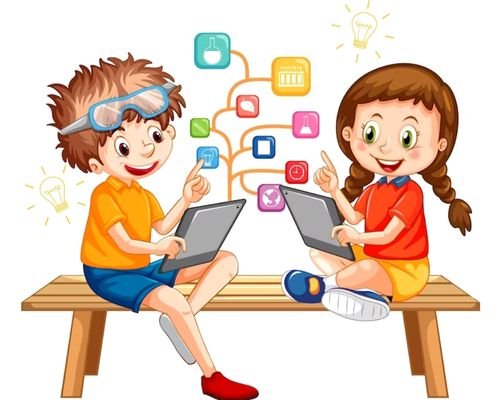Without a doubt, as we all know, computers were created by people. But don’t you think we have gained much from computers as they have developed over the past few decades? Computational thinking is a vital ability for kids entering school for the first time and will help them in the long term.
To begin with, computational thinking (CT) is a problem-solving process with a variety of properties and attitudes. “Computation” simply means the action of mathematical calculation.
Computational thinking is the ability of an individual to think and solve problems like a computer.
In computer science, a “computation” is an operation that starts with certain beginning circumstances and ends with an output that is specified by a particular set of rules. The most frequent instance of this is when a computer does calculations, when the fixed set of instructions may be the functionalities provided by a certain programming language.
In this article, we shall discover the methods used to create this system. We will also be knowledgeable of the many advantages of computational thinking and how it may help your children become ready for their future ambitions.
Parts of Computational Thinking
Decomposition
Decomposition is the first step in computational thinking. It involves decomposing complicated statements into simpler ones. This makes it simple and feasible to attain the desired resolution.
Abstraction
Focusing on the important information only, and ignoring irrelevant details; assists in task prioritization and systematic execution. By using abstraction, we can make a task simpler. It retains what is important and discards the remainder.
Logic/ Pattern Recognition
Another component of this ability is pattern recognition. A child’s capacity for object and picture analysis is necessary for systems to be designed.
A kid can determine between similar and dissimilar things. And every kid may think of the following move thanks to this talent: It has a strong influence on a kid’s capacity to mix several patterns and display the desired outcomes.
Algorithms Developing a step-by-step solution to the problem
In general, an algorithmic approach to a particular problem involves creating specific guidelines that have to be used to resolve an issue. Algorithms are a collection of guidelines developed by a person to solve related issues.

Benefits of Computational Thinking
Computational Thinking in Problem-solving
Kids can become great problem solvers if they start creative thinking like computers. Kids with great problem-solving abilities are good at mathematics and logical reasoning, which help with better decision-making.
Creativity
We are aware that children who use computers seem to be more creative. But have you ever considered thinking like a computer? Even so, a child with computational thinking skills is far more creative.
Computational thinking and innovation
When we think of new ways of solving any kind of problem, we invent new possibilities.
Abstraction can help a lot with innovation. Innovation benefits heavily from abstraction. A child not only gets rid of unnecessary items, but they also begin with a new purpose and efficiency. Children may be more focused on the materials and tools they will use to create new works.
How is computational thinking beneficial for kids?
As per the National Education Policy, computer coding has become mandatory in India. We can see that the government places a high priority on teaching our younger generation digital skills.
In such an ecosystem, thinking like a computer has become unavoidable. Everyone needs to be able to do this. It helps kids understand how tools like computers and machinery work.
In the coming decade or two, we believe that this generation will be well-trained and make an important contribution to the world. For the incoming workforce to fulfill the demands of the Fourth Industrial Revolution, the World Economic Forum recommends a revolution in the educational ecosystem. Although it is challenging to predict future employment trends, we can educate our kids with the following five crucial skills to succeed in the workforce:
1. Teach Computer Programming
Kids are being prepared to manage new software programs and media platforms with confidence thanks to these cutting-edge educational strategies, as well as access to millions of applications and online programs. They thereafter explore concepts they don’t fully understand without hesitation. Educating children about computational thinking and the language of code empowers them with the ability to identify patterns in data, analyze system architecture, and interpret the mysterious discoveries of artificial intelligence. They are more capable of handling whatever advances are introduced in the future, whether they be in the fields of architecture, production, or commerce.
2. Process learning
Knowledge is a real challenge in the digital world. Students in traditional educational models are expected to learn data and formulas that are already available to them via mobile search engines, spreadsheets, and calculators. Students must understand the fundamental concepts of arithmetic, physics, grammar, and computers to succeed in the modern world. Our future workforce will be able to make sense of new information when it is introduced if they have a strong knowledge base. They will be responsive enough to new forms of operations. As they will be allowed to explore the subjects that are important to them, they will be inspired to become self-motivated lifelong learners.
3. Teach Teamwork
If schools place a greater focus on project-based schoolwork, students will be far more qualified for the workforce. Students are encouraged to define goals, use project management tools, pool resources, compromise on their ideas, and negotiate their views through these assignments. Also, they pick up skills like developing empathy for others and building trust.
These cooperative social skills are extremely valuable and should not be underestimated. According to studies, the effectiveness and productivity of a company are directly impacted by teamwork. Kids must also have many opportunities to practice working with individuals of all ages, genders, and economic levels.
4. Communication Skills
Having great written and verbal communication skills are essential for working as a team. This idea goes far beyond simply understanding the rules of language. Kids must learn how to describe issues, explain their suggestions, and skillfully handle conflicts. The chance for discussion and thought on how procedures can have been improved should be provided to students after projects. A company’s bottom line is directly impacted by its ability to communicate effectively and clearly. Confusion and perhaps expensive financial crises are caused by mistakes. Communication in the corporate environment must be clear and exact, as well as polite so that others feel appreciated. Being a good communicator also means being a good listener, which is a skill that few schools focus on developing
5. Teach problem solving
Companies in the 21st century need to hire creative thinkers who can simplify existing operations, build components more quickly, and create new innovative products to stay competitive. They require visionary staff members who are unbound by limiting systems or procedures. On the other hand, kids are bound by strict compliance guidelines that set limits on their behaviour and what they are allowed to study.
In conclusion
We can say that when kids develop computational skills, they can articulate a problem and think logically. It helps them break down the issues at hand and predict what may happen in the future. It’s helping them to explore cause and effect and analyze how their actions or the actions of others impact the given situation. And for this, we offer online coding classes for kids that are specially designed to enhance their thinking capability and programming skills as well.
We at “GoGlobalWays” provide comprehensive lessons, projects, and exercises to help them understand the fundamentals of coding and develop the skills they need to become successful coders. Our classes also focus on developing teamwork and collaboration skills, as well as introducing students to the latest technologies in the industry. We offer a fun and engaging learning environment where kids can explore their coding potential and create amazing projects.




